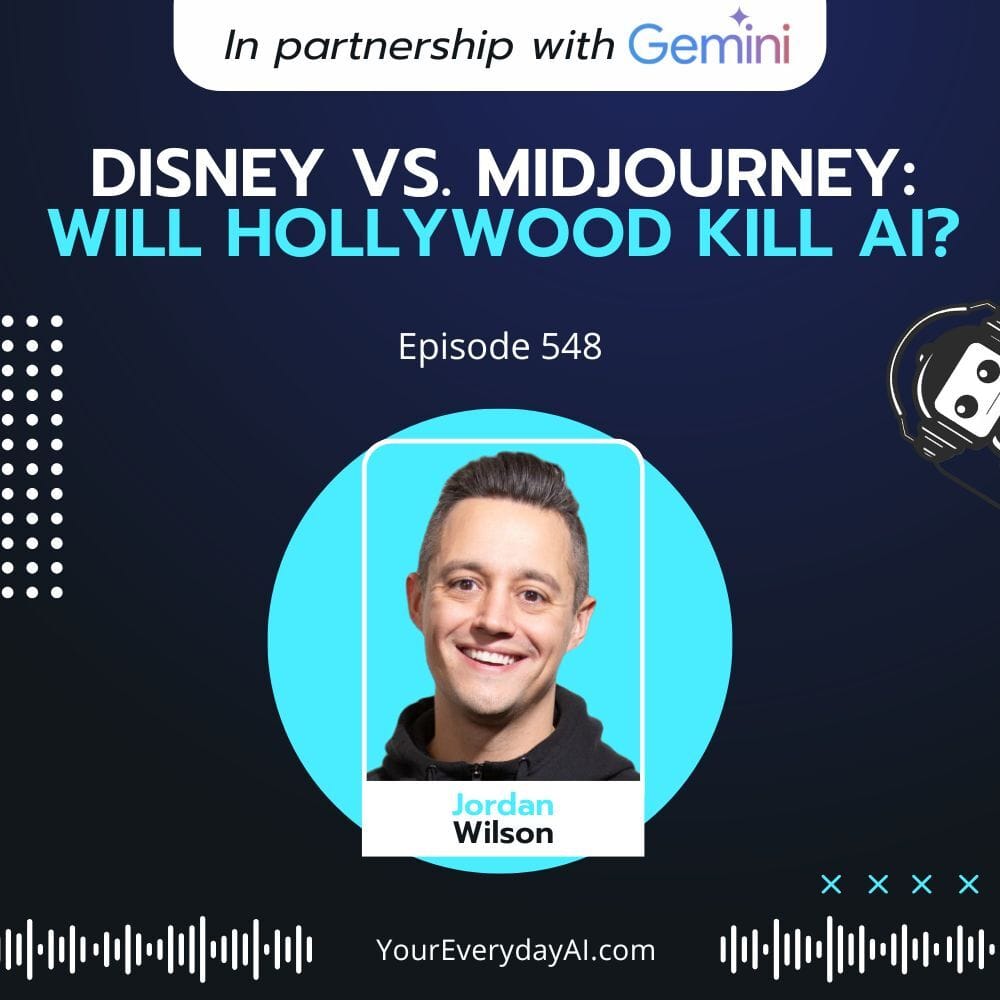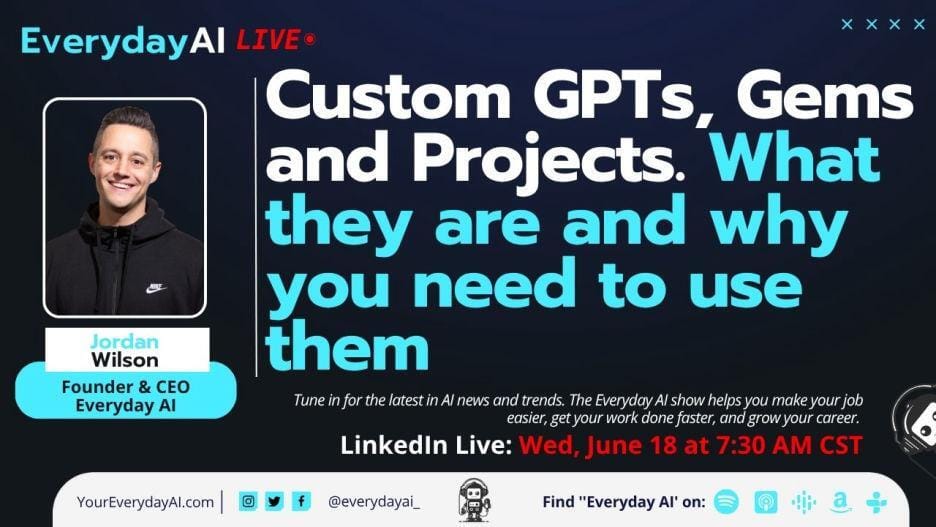- Everyday AI
- Posts
- Disney vs. Midjourney: Will Hollywood kill AI?
Disney vs. Midjourney: Will Hollywood kill AI?
Google Gemini 2.5 Flash-Lite, OpenAI and Microsoft tensions rise, Microsoft warned to update Copilot claims and more!
👉 Subscribe Here | 🗣 Hire Us To Speak | 🤝 Partner with Us | 🤖 Grow with GenAI
In Partnership With
Meet Gemini, Your Personal AI Assistant
Check out Veo 3, Google’s state of the art AI video generation model in the Gemini app, which lets you create high quality, 8-second videos with native audio generation.
Try it with the Google AI Pro plan, or get the highest access with the Ultra Plan. Sign up at Gemini.Google to get started and show us what you create.
Outsmart The Future
Today in Everyday AI
6 minute read
🎙 Daily Podcast Episode: Disney and Universal sue AI company MidJourney over copyright infringement. Could this mean the end for AI-generated content? Discover the implications in this AI showdown. Give it a listen.
🕵️♂️ Fresh Finds: China’s spy agencies investing in AI, Google now counting click/impressions from AI Mode and Meta testing auto-generated video ads. Read on for Fresh Finds.
🗞 Byte Sized Daily AI News: Google unveils Gemini 2.5 Flash-Lite, OpenAI and Microsoft tensions rise and Microsoft warned to update Copilot claims. For that and more, read on for Byte Sized News.
🧠 Learn & Leveraging AI: If Midjourney is being attacked by the big wigs, is AI content done for? We break down the AI implications. Keep reading for that!
↩️ Don’t miss out: Did you miss our last newsletter? We talked about Google adding Audio Overviews to search, ChatGPT fueling delusions, AMD challenging NVIDIA with new AI chips and more. Check it here!
Disney vs. Midjourney: Will Hollywood kill AI? 🎬
If Midjourney is the first AI company to go down, will YOU be going down with them?
Disney and Universal launched a massive lawsuit against AI image-generating giant Midjourney, but there's a catch.
Have you been following Midjourney's Terms of Service the last few years?
We're breaking down what might happen if the Hollywood Studios win their lawsuit against Midjourney and what it could mean for the rest of us.
Also on the pod today:
• AI Image Generators Under Legal Scrutiny ⚖️
• AI and Copyright: Visual vs. Text Differences 🔍
• Potential Impact: Hollywood's AI Legal Precedent 🎥
It’ll be worth your 32 minutes:
Listen on our site:
Subscribe and listen on your favorite podcast platform
Listen on:
Upcoming Everyday AI Livestreams
Wednesday, June 18th at 7:30 am CST ⬇️
Here’s our favorite AI finds from across the web:
New AI Tool Spotlight – Superdash is a document collection AI agent, Tila AI lets you create, search, code and design on one platform and Pulze lets you easily create AI agents and workflows.
Trending in AI – Researchers suggest that China’s spy agencies are investing heavily in AI.
Google – Google Search Console is now counting clicks, impressions and positions from AI Mode.
Meta – Meta is testing new auto-generated video ads.
Future of Work – ‘AI Godfather’ Geoffrey Hinton speaks on which AI jobs are safest and which are at the highest risk.
AI Research – A poll by Reuters found that the public is turning to chatbots for news updates.
AI Governance – California experts proposed a new framework for governing advanced AI models with increased transparency and independent review.
1. Google Unveils Gemini 2.5 Flash-Lite: Fastest and Most Cost-Efficient Yet ⚡
Google has made its Gemini 2.5 Flash and Pro models generally available, marking a key step for developers relying on robust AI performance. Alongside, it introduced the preview of Gemini 2.5 Flash-Lite, touted as the fastest and most cost-effective in the 2.5 lineup, ideal for high-volume, latency-sensitive tasks like translation and classification.
The new model supports advanced features like multimodal input, a massive 1 million-token context window, and tool integrations such as Google Search and code execution. According to Google’s latest technical report, these upgrades aim to push AI capabilities while balancing speed and cost
2. OpenAI and Microsoft Tensions Rise Amid Strategic Standoff 😬
According to The Wall Street Journal, cracks are emerging in the once-solid partnership between OpenAI and Microsoft, with OpenAI considering public accusations of anticompetitive behavior and even a federal review of their contract.
The friction centers on OpenAI’s $3 billion acquisition of AI coding startup Windsurf, which Microsoft fears could strengthen a rival to its GitHub Copilot tool. OpenAI seeks to reduce its dependence on Microsoft’s cloud services while still needing Microsoft's approval for its business restructuring.
3. Microsoft's Copilot Claims Face Scrutiny from Advertising Watchdog ⚖️️
A recent review by the BBB National Programs’ National Advertising Division (NAD) calls on Microsoft to rethink its bold productivity claims around Microsoft 365 Copilot, urging clearer disclosure of its Business Chat limitations.
NAD found Microsoft’s cited user productivity percentages don’t fully back up the objective claims, warning that the sweeping "Copilot" branding across multiple products is causing confusion among users. Despite Microsoft’s disagreement, it has pledged to follow NAD's recommendations, signaling potential upcoming changes in how Copilot is marketed.
4. OpenAI Launches Government-Focused AI Initiative 🛡
OpenAI has unveiled "OpenAI for Government," a new program designed to bring its top-tier AI tools directly to U.S. federal, state, and local agencies, aiming to streamline public service and reduce bureaucratic workload. The initiative consolidates existing government collaborations and kicks off with a $200 million pilot partnership with the Department of Defense to improve operations from healthcare to cyber defense.
Early pilots show promising results, like Pennsylvania state employees saving nearly two hours daily on routine tasks, signaling potential for major efficiency gains in public sector work.
5. Europe’s AI Sovereignty Push Gains Momentum with NVIDIA’s Backing
Europe is accelerating its AI infrastructure efforts as NVIDIA CEO Jensen Huang tours major capitals, urging rapid investment to reduce reliance on U.S. tech giants. British and French leaders are committing billions to boost computing power and digital sovereignty, with Germany planning AI cloud platforms alongside NVIDIA and Deutsche Telekom.
Homegrown startups like Mistral aim to rival U.S. rivals but face steep challenges from high energy costs and scale gaps.
6. Adobe Firefly AI Goes Mobile with Video Tools 📱
Adobe has just launched its Firefly AI platform on iPhone and Android, letting users generate images and videos from text descriptions right on their phones. This move brings popular AI features like Generative Fill and Expand from Photoshop to mobile, plus access to third-party models like Google’s Imagen and OpenAI’s image generator.
The Firefly app syncs creations to Creative Cloud, making it seamless for creatives to switch between mobile and desktop workflows.
🦾How You Can Leverage:
Disney is suing Midjourney but you'll never guess where Midjourney is trying to pass the blame to….
…..
YOU! The user.
Wild, right?
While the real news that's grabbing headlines is that Disney and Universal are suing the AI image generator company Midjourney, there's a larger story lurking underneath.
Where's it hiding?
In Midjourney's Terms of Service.
That's why we had to give this saga the #HotTakeTuesday treatment on today's show — it could get WIIIIILD shorties.
While it seems pretty cut and dry that Midjourney's outputs look just like copyrighted content, that's only half the story.
Here's what you need to know. 👇
1 – The Sneaky Liability Switch 🕵️
We dug through archive.org and found every version of Midjourney's terms since 2022.
In early 2024, they rewrote their user agreement to make YOU responsible for copyright violations AND paying THEIR legal fees.
We warned about this exact move in episode 180 because no other AI company was doing this.
Disney's 110-page lawsuit proves this matters: Midjourney generates recognizable copyrighted characters from generic prompts like "masked villain in space."
The new terms say users will "indemnify and hold harmless" Midjourney from any third-party claims, meaning if Disney sues over your Mickey Mouse marketing image, users could be on the hook.
Not Midjourney.
We stopped using Midjourney because of these terms changes.
Try this: Implement a formal AI image audit protocol this week.
Create a spreadsheet documenting every AI-generated image your company has used in marketing materials over the past 18 months, including the exact prompts and the AI service used. According to recent corporate AI policy research, 38% of employees admit to sharing sensitive work data with AI tools without proper oversight.
Email your current AI vendors about their legal protections for any copyright infringement claims. If they can’t back you, you should probably step back from them.
2 – The CEO’s Damaging Confession 💣
Midjourney's CEO admitted in a 2022 interview that the company basically scrapes all the data they can on the internet without tracking permissions.
The studios claim this explains why typing "superhero" produces Marvel-style characters and "space warrior" outputs Star Wars-looking figures.
Disney sent a cease and desist in 2023, but according to the lawsuit, Midjourney ignored it and released an "improved version" while still showcasing Disney fan art on their homepage.
Those viral Stormtrooper vlogs everywhere right now?
They're using characters that look remarkably similar to Disney's lawsuit evidence.
The timing is absolutely bonkers.
Try this:
Switch to enterprise-grade AI image generators that provide legal protection immediately.
Adobe Firefly explicitly states they provide legal indemnification and train only on licensed content, while Microsoft's AI tools are integrated into enterprise workflows with corporate backing.
Create an internal AI acceptable use policy this month that prohibits inputting confidential data into AI tools and requires human oversight for all customer-facing AI-generated content.
3 – The Startup Elimination Strategy 🎯
Studios won't sue Microsoft or Google because it's too expensive and risky.
Midjourney is the perfect target: projected $500 million revenue with only eleven employees means big payout potential but weak legal defense.
When Disney wins, every other studio will copy this playbook to systematically eliminate independent AI companies.
Microsoft, Google, and Meta remain untouchable because they have trillion-dollar legal teams, even though they likely trained on similar content.
The music industry already tested this strategy with licensing deals that force smaller companies to pay tribute while larger competitors operate freely.
Independent AI creativity dies while Big Tech wins everything.
Try this:
Conduct an immediate vendor risk assessment using this framework: categorize every AI tool by company size, legal resources, and litigation vulnerability.
Prioritize migrating customer-facing content creation to Adobe Creative Cloud (which includes Firefly with legal indemnification), Microsoft 365 Copilot (integrated enterprise tools with corporate backing), or Google Workspace AI features.
Create a 90-day migration plan moving high-risk workflows away from AI companies without risk protection toward tools from companies that have both the legal resources to fight copyright battles and the corporate policies to provide user protection.









Reply